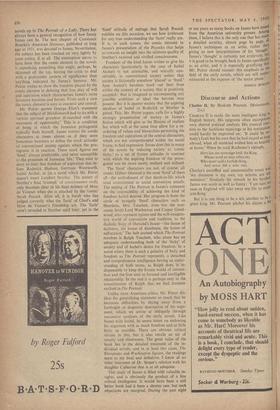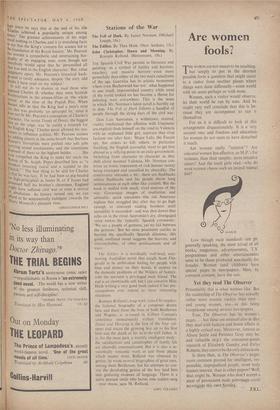Discourse and Actions
Charles 11. By Hesketh Pearson. (Heineman!' 21s.)
CHARLES II is easily the most intelligent king i English history. His epigrams often incorporat very shrewd political analysis. His ironical reac tion to the factitious rejoicings at his restoratio could hardly be improved on: 'It could be nc body's fault but his own that he had stayed so 1011 abroad, when all mankind wished him so heart!! at home.' When he read Rochester's epitaph,
Here lies our sovereign lord, the King, Whose word no man relies on; Who never said a foolish thing, And never did a wise one,
Charles's unruffled and unanswerable retort Wa 'my discourse is my own, my actions are ni ministers'.' Similarly his remark to his broth( James was acute as well as funny : 'I am sure n man in England will take away my life to mai" you King.'
But it is one thing to be a wit, another to be great king. Mr. Pearson pitches his claims a b
ligh when he says that at the end of his life Charles achieved a popularity unique among rulers. The greatest achievements of his reign 1Wed nothing to Charles, and it is stretching facts to say that the King's 'concern for science led to he foundation of the Royal Society.' Mr. Pearson has written a sympathetic and entertaining bio- graphy of an engaging man, even though not 'verybody would agree that he 'personified all that was best in the English character.' But, value judgments apart, Mr. Pearson's historical back- ground is rarely adequate, despite 'the sixty odd books I have read on my subject.' will not do to dismiss as mad those who 2posed Charles II. whether they were Scottish Presbyterians in the sixteen-fifties or 'the whole nation' at the time of the Popish Plot. When
,,
nurnet tells us that the King had a man's nose this was probably an episcopal lie,' since it iloes not fit Mr. Pearson's conception of Charles's character The secret Treaty of Dover, the biggest blot on the reign, was 'in reality a triumph for the English King.' Charles never allowed his mis- iresses to influence politics, Mr. Pearson assures ups' adding almost in the same breath that Barbara disposed sound emoluments, and she sometimes uisPosed of them to the highest bidder She et;.:en compelled the King to make her uncle the ,Ish013 of St. Asaph. Pepys described him as "a drunken swearing rascal and a scandal to the Church." The best thing to be said for Charles Is that he was lazy. If he had been as pig-headed ("r high-principled) as James II, or if James had Nssessed half his brother's cleverness, England rllight have suffered civil war or even a revival of absolutism. As history turned out, we can a‘linrd to be sentimentally indulgent towards the ierrY Monarch's pleasant vices. CHRISTOPHER HILL







































 Previous page
Previous page